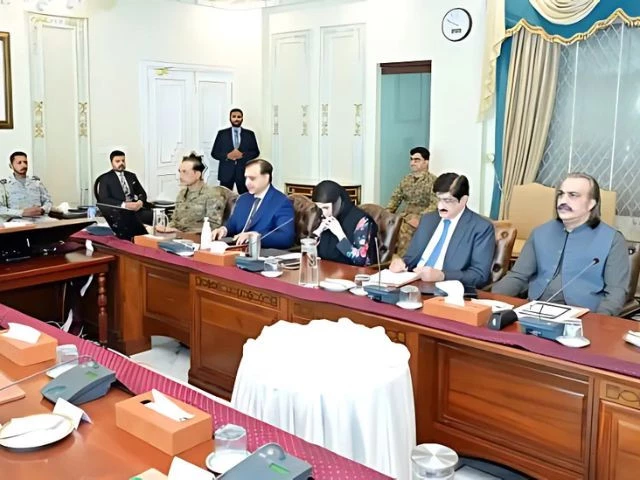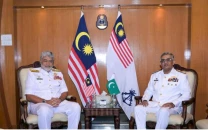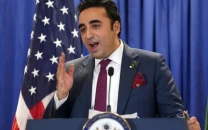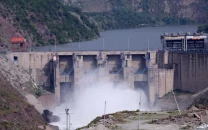PM Shehbaz orders united response against India's IWT water violation
India to get a befitting response from Pakistan under the decisions taken in the April 24 NSC meeting

Prime Minister Muhammad Shehbaz Sharif on Thursday condemned India’s unilateral suspension of the Indus Waters Treaty (IWT), calling it a “blatant violation” and an act of “water aggression” that will receive a resolute response.
Chairing a high-level meeting on water security, Sharif warned that any threat to Pakistan’s water rights would be met under national security decisions made on April 24.
He likened the water dispute to a battle for justice and vowed unity in the face of growing regional tensions.
The high-level meeting was attended by Deputy Prime Minister and Foreign Minister Ishaq Dar, Field Marshal COAS General Syed Asim Munir, federal ministers, chief ministers of all four provinces, Prime Minister of Azad Jammu and Kashmir, Chief Minister of Gilgit-Baltistan, and senior federal and provincial officials.
“This is a battle of justice, and like every battle we have fought with unity, we will defeat India’s water aggression with resolve and wisdom,” said the prime minister.
He emphasised that living nations confront challenges head-on and make strategic, lasting decisions to protect their future generations.
Addressing a high-level meeting on water security at the Prime Minister’s House, Shehbaz Sharif said India’s alleged attempts to weaponise water are intensifying, and stressed that the 1960 treaty, being a binding international agreement, does not allow any signatory to exit unilaterally.
He described India’s stance as “politically and legally hollow.”
The meeting was marked by a unified political front, with all four provincial chief ministers, the Prime Minister of Azad Jammu and Kashmir, and the Chief Minister of Gilgit-Baltistan jointly rejecting what they termed as Indian threats.
The prime minister welcomed this collective response, calling it “a reflection of our collective national resolve to protect Pakistan’s water security.”
In response to the situation, the prime minister directed the formation of a high-level committee under Deputy Prime Minister Ishaq Dar.
Read more: Modi says Pakistan will not get water from Indian-controlled rivers
The body has been tasked with devising funding strategies for new dam projects and includes representation from all provinces, AJK, and relevant federal ministries. The committee has been instructed to present its findings within 72 hours.
“We will prioritise the construction of non-controversial reservoirs. Wherever there is unanimity, we must act without delay.
These dams are not political — they are a national necessity,” the Prime Minister said. He made it clear that any project with cross-provincial consensus will be fast-tracked and completed on a priority basis.
A technical briefing during the session detailed Pakistan’s current water storage capacity and ongoing projects. The Diamer-Bhasha Dam is scheduled for completion in 2032, while the Mohmand Dam is expected to finish by 2027.
Also read: Pakistan warns India: don't weaponise water
Pakistan currently has 11 operational dams with a cumulative capacity of 15.318 million acre-feet. Under the Public Sector Development Programme, 32 dams are under construction, and 79 other projects are underway through annual development schemes.
Highlighting infrastructure challenges, Shehbaz Sharif drew attention to sediment accumulation in existing dams such as Tarbela and Mangla, which has severely reduced their efficiency. He urged the leadership to make bold choices, warning that future generations would judge them for inaction.
“We owe it to our 240 million people to act decisively. This is not about politics — it’s about survival. The future generations must remember this leadership with respect for the choices we make today,” he declared.
Read: Pakistan will never accept Indian hegemony, says Field Marshal Munir
The prime minister also praised the efforts of the finance and economic affairs ministries, as well as key officials, for securing loans from the World Bank and Asian Development Bank. He claimed that Indian lobbying efforts to derail Pakistan’s funding plans at the ADB had failed.
“India tried to sabotage our projects at the ADB for three days, but failed. Our diplomatic victory is a testament to Pakistan’s principled stand and growing credibility,” he noted.
As the meeting concluded, Shehbaz Sharif reiterated confidence in the solidarity of Pakistan’s political and military leadership. “Just as our brave armed forces stood firm in the battlefield, we must now stand united in securing every drop of water for our people,” he said.
Among those present at the meeting were Deputy Prime Minister Ishaq Dar; Chief of Army Staff Field Marshal General Syed Asim Munir; Defence Minister Khawaja Muhammad Asif; Planning Minister Ahsan Iqbal; Law Minister Azam Nazir Tarar; Information Minister Attaullah Tarar; Power Minister Owais Leghari; Water Resources Minister Muneeb Wattoo; and other senior federal officials.
Read: Won't allow India to cross IWT red line: PM
Chief Ministers Maryam Nawaz (Punjab), Murad Ali Shah (Sindh), Ali Amin Gandapur (Khyber-Pakhtunkhwa), and Sarfraz Bugti (Balochistan) also participated, along with AJK Prime Minister Anwarul Haq and GB Chief Minister Gulbar Khan.


























COMMENTS
Comments are moderated and generally will be posted if they are on-topic and not abusive.
For more information, please see our Comments FAQ